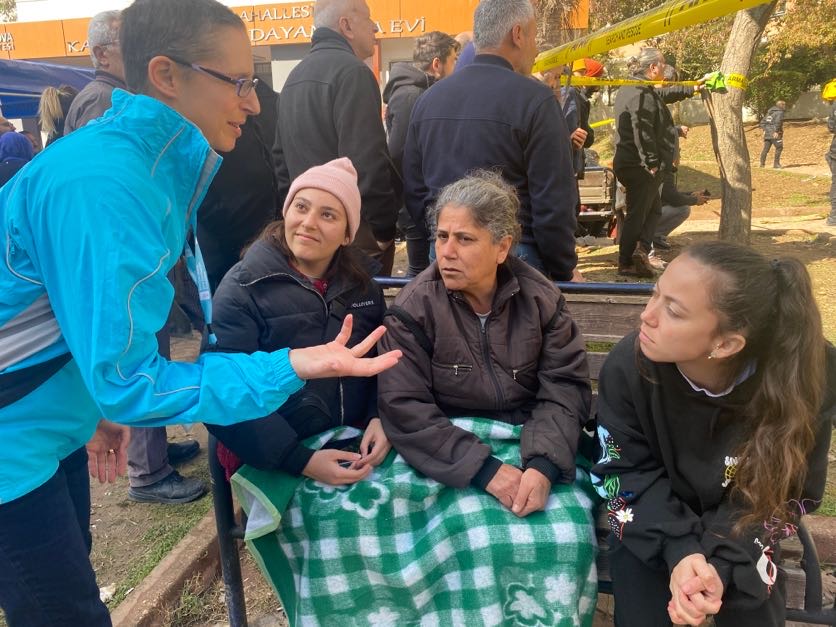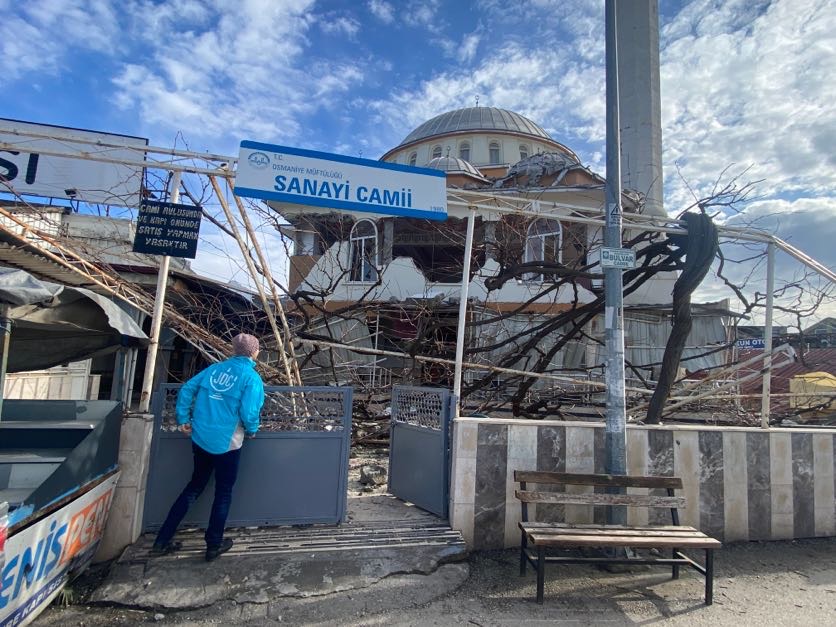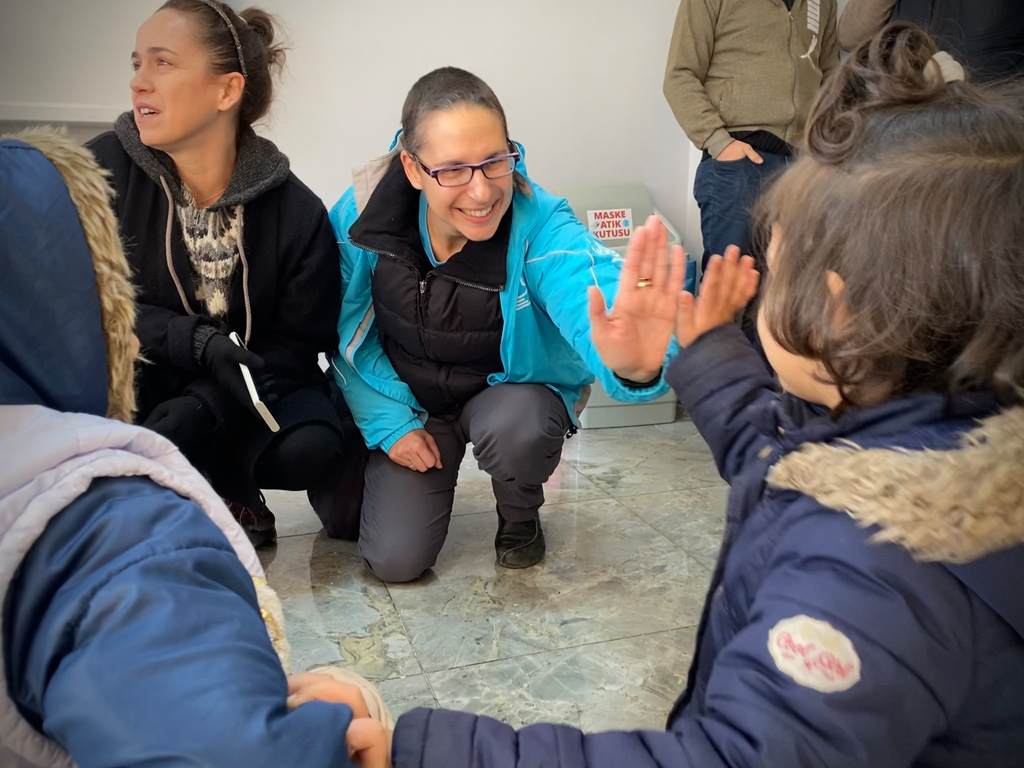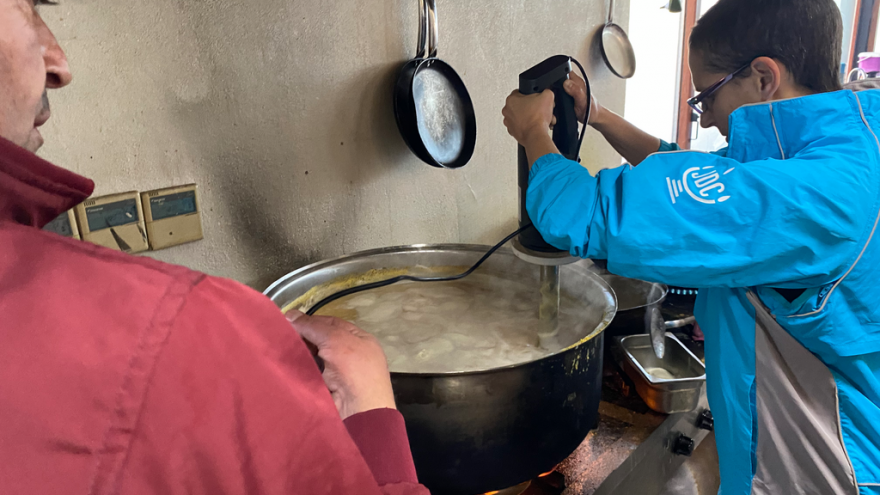After a week-and-a-half on broken ground in Turkey, Leora Wine, director of disaster response for the American Jewish Joint Distribution Committee (JDC), thinks Turkey is still in transition from rescue to recovery.
“That’s why the need is actually even greater now—because people are not back in their houses yet. People are starting to kind of figure out what’s next,” Wine told JNS.
JDC and partners helped fund the transportation and care of that community of about 20 people, whose roots date back 2,500 years. Şaul Cenudioğlu, the community’s president, and his wife, Tuna, died in the quake. The other community members were brought to İstanbul and Mersin, a large port city.
Deniz Baler Saporta, a Turkish Jewish community spokeswoman, told JNS that a damaged Torah scroll from Antakya’s synagogue arrived safely at the synagogue in Adana in southern Turkey.
The JDC, which leads Jewish communal response to disaster and international development crises across the globe, has provided aid on the ground in Turkey following many earthquakes, which its staff said prepared it for last week’s disaster. The JDC leads the Jewish Coalition for Disaster Relief (JCDR), 49 largely North American Jewish organizations that address global disasters and development challenges.

Wine said the work can be overwhelming, given all the devastation. “Just in terms of the rubble and the wreckage, I’ve been through about four different regions, looking at different sites,” she said. “Each one has their own stories and people.”
Wine’s team has distributed hot soup and warm blankets to people in Gaziantep and Kilis in southern Turkey, along with its partner, International Blue Crescent. As of Monday, the JDC had distributed some 7,000 meals and 10,000 blankets. Efforts are now focusing on winterization, including sourcing and distributing heated tents, thermal clothing, portable heating, ready-to-eat meals and first-aid kits. Preparations are also underway to deliver medical equipment to badly damaged hospitals.
“People are outside, and even when they’re in their tents, it’s still cold,” said Wine. “You have to try and find ways to keep them warm, especially the kids.”
Wine described for JNS a drive down a road in Islahiye this past weekend. She saw people emerging from a wreckage site, and when she and her crew spoke with them, they learned it was a father and son exiting his sister’s house.
“She and her whole family were gone,” reported Wine. “They were going back to see what they could find, to see who was there.”
Wine met a woman sitting near a disaster site in another city. When the quake struck, the woman had been inside a building, which collapsed, falling sideways.
“She couldn’t get out by herself to call for help,” said Wine. “Then somebody outside said, ‘I hear you. I’m coming.’ And this man pulled five people out of the building. In the midst of all this wreckage, and all of this wetness and dirt and smoke and dust, you then see these glimmers of hope. You see it a lot also from the Turkish people.”
Two men were traveling to disaster zones merely to pour traditional Turkish tea to those in need, and hot lentil soup is “a really big thing here,” said Wine. “In the beginning, people were making it for their neighbors, and then restaurants were opening their buildings. The restaurants aren’t selling food, but if you see smoke outside of a restaurant, that means that they’re just giving away food. You see this community activism and resilience in the midst of a lot of destruction.”
Wine noted biting cold sets in at night, and even those whose homes remain standing won’t sleep in them until civil engineers have inspected them for safety. So people sleep in their cars or in already-approved buildings to stay warm.

‘We look to leverage other efforts’
Wine and team are prepared to be in Turkey for the long term, without knowing the exact parameters. Each disaster is unique, she told JNS. They stayed in the Bahamas for three years after the 2019 hurricane, but Turkey could be totally different. Much depends on what is needed—whether it is rebuilding schools, providing medical expertise in hospitals, diversifying livelihoods, community resilience or preparedness for the future, she said.
JDC spokesman Michael Geller tells JNS that the organization will provide Turks with “a skill set to build back and build back stronger, and that can be disaster-preparedness training. It can also be anti-seismic building projects and other efforts strengthening vulnerable populations.”
Wine described near-constant communication with the coalition of Jewish organizations and NGOs. That includes coordinating accommodations and translator availability.
“Some organizations work right at the beginning. Some work later. Some work longer term,” she said. “We always look to leverage these other efforts and not to duplicate, and that’s what’s happening.”
She has seen the “Turkish spirit” close up, as in a grassroots organization working with a restaurant in Gaziantep that is feeding the needy. Wine said people were coming in requesting bread as she kneaded and baked bread in the restaurant. In a “very human moment,” an older, very-shy woman put up a single finger asking for a piece of bread.
“It was amazing that I was able to be the conduit to do that,” she said. “You have all these young volunteers that are taking items off of trucks, organizing them, putting them in warehouses and distributing them. I wish I could explain the feeling more of what it’s like, but I often get overwhelmed by being on the ground with so many people behind me.”
Overall, there is a sense of unity and humanity, Wine said. “As a Jewish organization, being on the ground helping other humans is a great thing,” she said.
Julie Platt, chair of the Jewish Federations of North America, which largely funds JDC’s disaster relief work, told JNS that her organization will provide whatever resources Turkey needs to recover, despite its Jewish population paling in comparison to Ukraine, where the federations are also hard at work.
She noted the importance of the existing network that Jewish aid groups had built in Turkey and how vital that was now that the country is in crisis. “The most amazing thing to me is that when we lost the leaders of the Antakya Jewish community, we knew instantly their names, we knew their family to call in Israel to see if they had heard from them,” said Platt. “We knew how to take care of the 50,000 Jews in Turkey in a moment.”
She added that “more than 121 local Jewish federations had people contribute funds for Turkey. I think it’s inspiring.”
And she shared a quote that when it rains in Poland, a North American Jew opens an umbrella: “Jews don’t care where you are. If you’re in trouble, we’re there.”



























